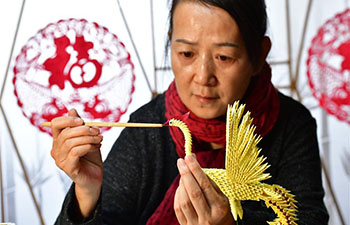WASHINGTON, Jan. 3 (Xinhua) -- Simply testing the level of caffeine in the blood could help determine if a person has Parkinson's disease, a new study suggested Wednesday.
People with the degenerative disease have significantly lower levels of caffeine in their blood than people without the disease, even if they consume the same amount of caffeine, according to the study published online in Neurology, the American Academy of Neurology's medical journal.
"Previous studies have shown a link between caffeine and a lower risk of developing Parkinson's disease, but we haven't known much about how caffeine metabolizes within the people with the disease," study author Shinji Saiki of Juntendo University School of Medicine in Tokyo, Japan, said in a statement.
The study involved 108 people who had Parkinson's disease for an average of about six years and 31 people of the same age who did not have the disease.
Their blood was tested for caffeine and for 11 byproducts the body makes as it metabolizes caffeine.
The two groups consumed about the same amount of caffeine, with an average equivalent to about two cups of coffee per day.
But the people with Parkinson's disease had significantly lower blood levels of caffeine and nine of the 11 byproducts of caffeine in the blood.
The caffeine level was an average of 79 picomoles per 10 microliters for people without Parkinson's disease, compared to 24 picomoles per 10 microliters for people with the disease.
The study participants were also tested for mutations in genes that can affect caffeine metabolism, but no differences were found between the two groups.
Moreover, people in the study with more severe stages of the disease did not have lower levels of caffeine in the blood, suggesting that the decrease occurs from the earliest stages of the disease.
"If these results can be confirmed, they would point to an easy test for early diagnosis of Parkinson's, possibly even before symptoms are appearing," said David Munoz of the University of Toronto in Canada, who wrote an editorial accompanying the study.
"This is important because Parkinson's disease is difficult to diagnose, especially at the early stages."

















